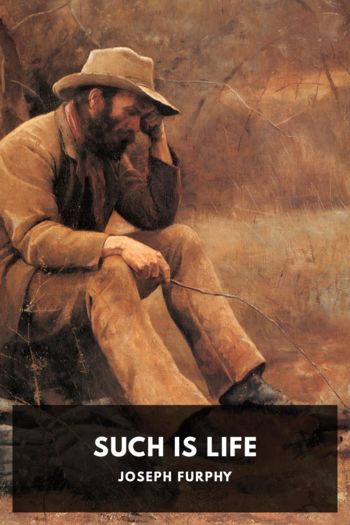Such Is Life, Joseph Furphy [online e book reading txt] 📗

- Author: Joseph Furphy
Book online «Such Is Life, Joseph Furphy [online e book reading txt] 📗». Author Joseph Furphy
“Aisy, Tammas! For marcy sake, don’t! Can’t ye take the shurt aff the nail without cuttin’ it?”
At this moment, the engine driver threw the fan belt off, and Rory was soon liberated. His satisfaction at finding the garment almost uninjured was but slightly dashed by the bruise on his arm. The latter would heal of itself; the former wouldn’t. But for the rest of the day he kept his eye on that key.
Among the few things he brought out with him from home was the old-fashioned habit of sleeping in his skin—a usage, by the way, more to be commended than the converse custom, practised by English coal-miners, of turning into the blankets and out again fully dressed, till the raiment, never removed, rots off by effluxion of time. Rory maintained that his system added considerably to the lifetime of a shirt.
However, one Sunday forenoon, while we were enjoying that second sleep which gives to the Day of Rest its true significance, the smouldering fire ate its way through the side of the log chimney, and caught a couple of hundred two-foot shingles, stacked in the angle outside. It was about half-past ten when Rory was awakened by a crackling sound close beside him; and the first sight he saw was a broad tongue of flame leaping in under the eave, and licking the rafter above his head.
He had heard of bushfires; and though he knew the locusts were starving on the surrounding plain, his roar of despair brought me to my feet on the floor. Immediately grasping the situation and a long-handled shovel, I called on him to bring a bucket of water. The barrel was empty, as a matter of course; and Rory cantered away down the road a quarter of a mile, to where a deep crab-hole—replenished by the rain before referred to—furnished our supply. But, in the panic of the moment, it escaped his observation that he was affording a scandalous spectacle to two spring-cartloads of assorted Cornish people, on their way to the local tabernacle. In fact, he had swooped up a bucket of water and turned back with it before he was aware that they had been close behind him all the time. His first thought was to squat down, taking cover behind the bucket; but, remembering the exigency of his errand, he girded up his fortitude—which was the only thing he had to gird—and faced the springcarts, for the sake of my hut, as bravely as his ancestors had faced earcropping, and similar cajoleries, for the sake of the wan thrue Church. And there was no more joke about the later martyrdom than about the earlier. However, by the time he returned, I had thrown the burning shingles to a safer distance, and removed all the loose fire, so that the bucket of water made everything safe.
Owing to the fire being on the side of the hut furthest from the road, the churchgoers never noticed it. Hence they assumed that Rory was casually bringing the water for domestic purposes; and their unavoidable inference placed the Irish Catholics on a lower moral plane than the Aborigines, by reason of their priests keeping them in ignorance. This misconception had acquired all the solidity of fact before it reached me; consequently, my explanation was received as a well-meant fib. Anyway, these details will give you some idea of Rory, in his natural state as a colonist.
After the first fortnight or so, I frankly told him that, though nothing would suit my own interests better than a lifelong extension of his assistance, I wouldn’t advise him to stay, as there could be no wages forthcoming. I had absolutely no money, nor was I likely to have such a thing in my possession till the forty-acre paddock was fenced, ploughed and sowed, and the crop (if any) harvested and sold. Even then—taking the average of the district—I couldn’t expect a return of more than £100; and out of this I would have to pay off an accumulated shortage of about £200.
“It’s a quare, quare counthry, anyhow,” sadly soliloquised the exile of Erin, after he had thought the matter over. “Wondhers’ll niver quit saisin’. At home, iv a body hed twenty English acres o’ good lay lan’, at a raisonable rent—let alone a graat farrum like thon—he needn’t do a han’s turn the year roun’, beyant givin’ ordhers; an’ he would hev lavin’s iv iverything, an’ a brave shoot o’ clo’es till his back, an’ mebbe a gool’ watch, furbye money in his pocket. Bates all! Bates all!”
But the anomalous and baffling nature of Australian conditions made Rory all the more reluctant to tear himself away from his present asylum—though its shelter seemed to resemble the shadow of a great deficit in an insolvent land.
So another fortnight passed, whilst each of us learned something from the other. I





Comments (0)